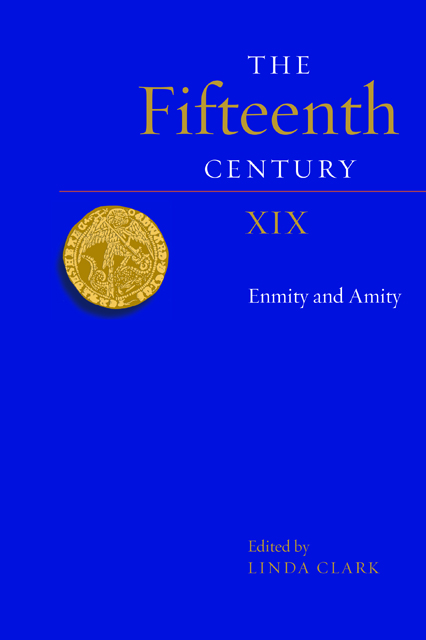Book contents
- Frontmatter
- Contents
- List of Contributors
- Preface
- List of Abbreviations
- England and Europe, c.1450–1520: Nostalgia or New Opportunities?
- Mariners and Marauders: A Case Study of Fowey during the Hundred Years’ War, c.1400–c.1453
- Henry V’s Army of 1417
- ‘Get out of our land, Englishmen’. French Reactions to the English Invasion of 1512–13
- Encountering the ‘Duche’ in Margery Kempe’s Lynn
- ‘C’est le Beaulté de Castille et d’Espaigne, qui le Soleil cler d’Austrice accompaigne’: Jean Molinet makes the Habsburgs Burgundian
- Magna Carta in the Late Middle Ages, c.1320–c.1520
- The Business of the Southern Convocation in 1462
- Index
- Contents of Previous Volumes
‘Get out of our land, Englishmen’. French Reactions to the English Invasion of 1512–13
Published online by Cambridge University Press: 20 December 2022
- Frontmatter
- Contents
- List of Contributors
- Preface
- List of Abbreviations
- England and Europe, c.1450–1520: Nostalgia or New Opportunities?
- Mariners and Marauders: A Case Study of Fowey during the Hundred Years’ War, c.1400–c.1453
- Henry V’s Army of 1417
- ‘Get out of our land, Englishmen’. French Reactions to the English Invasion of 1512–13
- Encountering the ‘Duche’ in Margery Kempe’s Lynn
- ‘C’est le Beaulté de Castille et d’Espaigne, qui le Soleil cler d’Austrice accompaigne’: Jean Molinet makes the Habsburgs Burgundian
- Magna Carta in the Late Middle Ages, c.1320–c.1520
- The Business of the Southern Convocation in 1462
- Index
- Contents of Previous Volumes
Summary
Get out, English, of our lands; Get out faster than at an amble.
The words are those of Laurent Desmoulins, a priest from the diocese of Chartres, who wrote them, in anger, in a long poem entitled La Folye des Angloys, in reaction to the English invasion of France in June 1513. The context was the renewed English aggression after nearly forty years of peace between the two countries, lasting since the truce of Piquigny had been signed between Louis XI and Edward IV on 29 August 1475.
In November 1511 Henry VIII joined the Holy League, a European alliance directed against France and comprising Spain (King Ferdinand II), Venice and the papacy (Pope Julius II), which had been formed at the pope’s instigation in the previous month, on 9 October. The Swiss joined it in May 1512, while Emperor Maximilian sat on the fence for a whole year before following suit in April 1513 as part of the League of Malines which was signed on 5 April, and after Venice had left the Holy League to join France in accordance with an agreement concluded at Blois on 23 March. The Holy League was the outcome of the complex and quickly shifting political situation in Italy since the late fifteenth century. In December 1508 Julius II had convinced Maximilian, Ferdinand II and Louis XII to join him in an alliance (the League of Cambrai), officially against the Turks, but secretly against the republic of Venice which was not only occupying papal territories and those of the duchy of Milan that Louis XII wanted to regain (Bergamo, Brescia and Cremona), but was also at war with Maximilian over territories in northern Italy to which the emperor laid claim. But after Louis XII’s victory against the Venetian armies at Agnadel on 14 May 1509, the pope, fearing the growing power of the French in northern Italy, decided to make peace with Venice and turn against France’s allies and interests in the peninsula. In response, in the spring of 1511, the king of France declared war on the pope and proceeded to capture Bologna (a papal stronghold) in May and summoned a schismatic General Council of the Church to be held in Pisa in November to depose Julius II.
- Type
- Chapter
- Information
- The Fifteenth Century XIXEnmity and Amity, pp. 68 - 89Publisher: Boydell & BrewerPrint publication year: 2022

